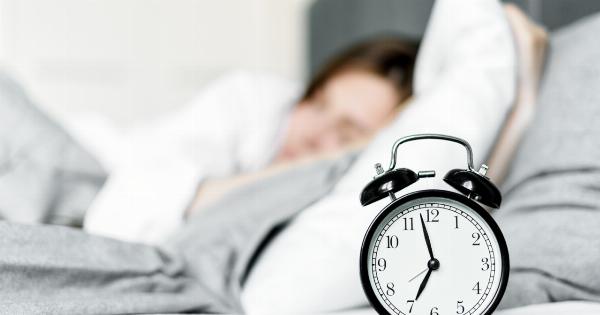Sleep plays a crucial role in maintaining overall health and well-being. Adequate sleep is not just essential for feeling refreshed and rejuvenated; it is also vital for various physiological processes that support cardiovascular health.
Research has shown that insufficient sleep can have detrimental effects on the body, including an increased risk of developing chronic conditions, such as obesity, diabetes, and cardiovascular diseases.
A recent study has found a concerning link between insufficient sleep and an increased risk of stroke in men.
The findings highlight the importance of prioritizing sleep health as a preventive measure against stroke, a condition that affects millions of individuals worldwide.
The Sleep-Duration Connection
Several studies suggest a strong association between the duration of sleep and the risk of stroke.
While the optimal sleep duration may vary from person to person, the general recommendation is to aim for seven to nine hours of sleep per night for adults. However, many people fail to meet these recommended guidelines and often experience insufficient sleep due to various reasons, such as work demands, lifestyle choices, or sleep disorders.
Researchers have found that consistently getting less than six hours of sleep per night increases the risk of stroke in men by up to four times compared to those who get sufficient sleep.
The risk remains significantly higher even after accounting for other factors, such as age, body mass index, smoking, alcohol consumption, and other cardiovascular risk factors.
The Mechanisms Behind Sleep and Stroke
The precise mechanisms linking inadequate sleep and stroke are not fully understood. However, several factors may contribute to this association. One of the prominent factors is the impact of sleep duration on blood pressure.
Inadequate sleep has been shown to elevate blood pressure levels, both at night and during the day. High blood pressure is a well-established risk factor for stroke.
Sleep deprivation can disrupt the body’s mechanisms that regulate blood pressure, leading to sustained elevated levels. Over time, this can increase the risk of developing hypertension and, consequently, stroke.
Furthermore, insufficient sleep can negatively affect other cardiovascular risk factors.
It can lead to weight gain and obesity, impair glucose metabolism and insulin resistance, and contribute to the development of diabetes, which are all conditions that significantly increase the risk of stroke.
Improving Sleep Health to Reduce Stroke Risk
Recognizing the importance of sleep for stroke prevention, adopting healthy sleep habits can significantly reduce the risk. Here are some tips to improve sleep health:.
1. Stick to a Regular Sleep Schedule
Try to go to bed and wake up at the same time every day, even on weekends. Establishing a consistent sleep schedule helps regulate your body’s internal clock and promotes better sleep.
2. Create a Relaxing Bedtime Routine
Engage in relaxing activities before bedtime, such as reading a book, taking a warm bath, or practicing meditation. These soothing activities can help signal to your body that it’s time to unwind and prepare for sleep.
3. Ensure a Comfortable Sleep Environment
Your sleep environment plays a significant role in the quality of your sleep. Make sure your bedroom is cool, dark, and quiet. Consider investing in a comfortable mattress, pillows, and bedding that properly support your body.
4. Limit Exposure to Electronics
Avoid using electronic devices, such as smartphones, tablets, or laptops, in the hour before bedtime. The blue light emitted by these devices can interfere with your sleep by suppressing the production of melatonin, the sleep hormone.
5. Avoid Stimulants and Heavy Meals Before Bed
Avoid consuming caffeine or nicotine close to bedtime, as they can disrupt your sleep. Additionally, large meals or spicy foods can cause discomfort and make it difficult to fall asleep.
Opt for light, easily digestible snacks if you need to eat before bed.
6. Regular Exercise
Incorporating regular physical activity into your routine can help improve sleep quality. Aim for at least 30 minutes of moderate-intensity exercise such as brisk walking, jogging, or cycling most days of the week.
7. Manage Stress Levels
Chronic stress can interfere with your sleep and increase the risk of stroke. Find healthy ways to manage stress, such as practicing relaxation techniques, engaging in hobbies, or seeking support from loved ones or a therapist.
8. Create a Sleep-Friendly Bedroom
Design your bedroom to be a sanctuary dedicated to sleep. Make it a comfortable, clutter-free space that promotes relaxation and tranquility.
9. Be Mindful of Your Alcohol Consumption
While alcohol may initially make you feel drowsy, it can disrupt your sleep cycle and prevent you from experiencing restful sleep. Limit your alcohol consumption and avoid drinking close to bedtime.
10. Seek Professional Help if Needed
If you consistently struggle with sleep and suspect you have a sleep disorder, such as sleep apnea or insomnia, consult with a healthcare professional.
They can evaluate your symptoms, provide an accurate diagnosis, and suggest appropriate treatment options.
By prioritizing sleep health and implementing these strategies, men can increase their chances of reducing the risk of stroke associated with insufficient sleep.
Sleep should not be dismissed as a luxury but recognized as a vital component of a healthy lifestyle and stroke prevention.






























